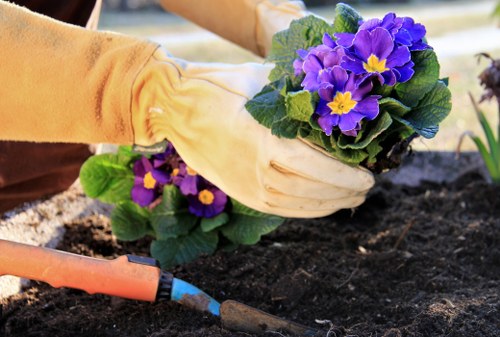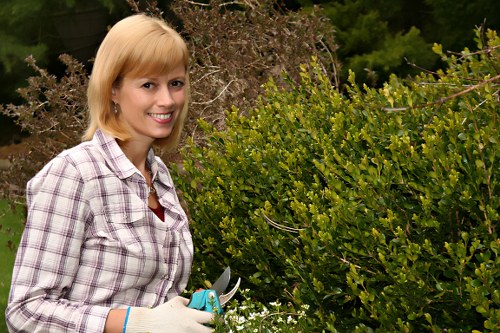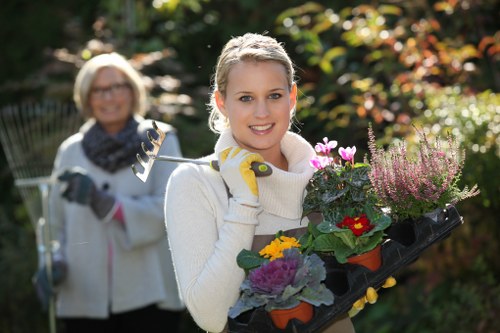Comprehensive Garden Maintenance in Wimbledon

Maintaining a beautiful garden in Wimbledon requires dedication, expertise, and the right tools. Whether you're a gardening enthusiast or a busy professional, proper garden maintenance ensures your outdoor space remains vibrant and healthy throughout the year.
Wimbledon’s climate presents unique challenges and opportunities for gardeners. Understanding the local weather patterns, soil types, and plant varieties is essential for successful garden upkeep.
In this article, we will explore the essential aspects of garden maintenance in Wimbledon, providing you with actionable tips and insights to keep your garden flourishing.
The Importance of Regular Garden Maintenance

Regular garden maintenance is crucial for several reasons. It enhances the aesthetic appeal of your property, increases property value, and creates a serene environment for relaxation and recreation.
Moreover, consistent upkeep helps prevent the spread of diseases and pests, ensuring that your plants remain healthy and robust.
By dedicating time to garden maintenance, you can address minor issues before they escalate, saving both time and money in the long run.
Key Benefits of Garden Maintenance

- Enhanced Curb Appeal: A well-maintained garden significantly improves the overall appearance of your home.
- Healthier Plants: Regular care ensures that your plants receive the necessary nutrients and are free from diseases.
- Environmental Benefits: Gardens contribute to a healthier environment by supporting biodiversity and reducing carbon footprints.
Investing in garden maintenance is not just about aesthetics; it's about creating a sustainable and enjoyable outdoor space.
Seasonal Garden Care in Wimbledon

Gardening in Wimbledon requires a seasonal approach. Each season brings its own set of tasks that are essential for maintaining a thriving garden.
Understanding the specific needs of your garden throughout the year can help you plan and execute maintenance activities effectively.
Let's delve into the seasonal maintenance practices that will keep your Wimbledon garden in top shape.
Spring Garden Maintenance

Spring is a time of renewal and growth. It’s the perfect season to prepare your garden for the upcoming months.
Start by clearing out any debris from the winter months. Prune dead branches, fertilize the soil, and plant new flowers and shrubs.
Spring is also an ideal time to plant annuals and perennials, ensuring they have ample time to establish themselves before the heat of summer.
Summer Garden Maintenance
During the summer, focus on watering, weeding, and pest control. Consistent watering is crucial, especially during Wimbledon’s warm spells.
Mulching can help retain moisture in the soil and suppress weed growth. Regularly check your plants for signs of pests and diseases, and take prompt action if needed.
Autumn Garden Maintenance
Autumn is the season to prepare your garden for the colder months. Rake leaves, prune plants, and protect sensitive species from frost.
Consider planting bulbs for spring blooms and enriching the soil with compost to ensure your garden remains fertile.
Winter Garden Maintenance
Even in winter, garden maintenance is essential. Protect your plants from frost by using covers and ensure pathways are clear of snow and ice.
Plan your garden layout and order seeds or plants for the upcoming year, setting the stage for a successful gardening season.
Essential Tools for Garden Maintenance

Having the right tools is fundamental to effective garden maintenance. Invest in high-quality equipment that will make your tasks easier and more efficient.
From basic hand tools to more specialized equipment, each tool plays a vital role in maintaining a healthy garden.
Here are some essential tools every Wimbledon gardener should consider:
Basic Hand Tools
- Pruners: Essential for trimming and shaping plants.
- Spades and Shovels: Useful for digging and planting.
- Hand Trowels: Perfect for smaller planting tasks.
Power Tools
For larger gardens, power tools like lawnmowers, hedge trimmers, and leaf blowers can save time and effort.
- Lawn Mower: Keeps your grass neatly trimmed.
- Hedge Trimmer: Maintains the shape of hedges and shrubs.
- Leaf Blower: Efficiently clears leaves and debris.
Gardening Accessories
Accessories such as gloves, knee pads, and watering cans enhance your gardening experience by providing comfort and convenience.
- Gloves: Protect your hands from thorns and dirt.
- Knee Pads: Offer cushioning while working close to the ground.
- Watering Cans: Ensure plants receive adequate moisture.
Choosing the Right Plants for Wimbledon Gardens

Selecting the appropriate plants is crucial for a thriving garden in Wimbledon. Consider factors such as climate, soil type, and sunlight exposure when choosing plants.
Opt for native and resilient species that can withstand Wimbledon’s weather conditions and require minimal maintenance.
Here are some plant recommendations for Wimbledon gardens:
Flowering Plants
- Roses: Classic and versatile, roses add beauty to any garden.
- Lavender: Offers a pleasant fragrance and attracts pollinators.
- Hydrangeas: Provide stunning blooms and add texture to the garden.
Vegetable Gardens
Growing your own vegetables can be rewarding and sustainable. Choose varieties that are well-suited to Wimbledon’s climate.
- Tomatoes: Thrive in sunny spots and provide delicious harvests.
- Leafy Greens: Spinach, kale, and lettuce grow well in cooler months.
- Herbs: Basil, parsley, and mint are easy to grow and useful in the kitchen.
Shade Plants
If your garden has shaded areas, opt for plants that thrive in low-light conditions.
- Hostas: Offer attractive foliage and thrive in shade.
- Ferns: Add a lush, green texture to shaded areas.
- Impatiens: Provide vibrant colors even in low light.
Soil Management and Fertilization

Healthy soil is the foundation of a thriving garden. Proper soil management and fertilization ensure that your plants receive the necessary nutrients for growth.
Regularly testing your soil can help you understand its composition and pH levels, allowing you to make informed decisions about amendments and fertilizers.
Here are some tips for effective soil management:
Soil Testing
Conducting a soil test provides valuable insights into the nutrient levels and pH balance of your soil.
- pH Levels: Most plants prefer a slightly acidic to neutral pH.
- Nutrient Content: Ensure adequate levels of nitrogen, phosphorus, and potassium.
Amending Soil
Based on your soil test results, amend your soil to improve its structure and fertility.
- Compost: Enriches the soil with organic matter and nutrients.
- Mulch: Helps retain moisture and regulate soil temperature.
- Lime or Sulfur: Adjusts soil pH as needed.
Fertilization
Regular fertilization provides essential nutrients that promote plant growth and health.
- Organic Fertilizers: Such as bone meal, fish emulsion, and composted manure.
- Synthetic Fertilizers: Offer precise nutrient ratios but should be used sparingly.
Pruning and Trimming Techniques

Pruning and trimming are vital for maintaining the shape and health of your plants. Proper techniques ensure that your plants grow robustly and remain free from disease.
Different plants require different pruning methods, so it's important to understand the specific needs of each species in your garden.
Here are some essential pruning and trimming techniques:
Pruning Trees and Shrubs
- Deadheading: Removing spent flowers to encourage new blooms.
- Thinning: Reducing the density of branches to improve air circulation.
- Shaping: Maintaining the desired form and size of the plant.
Trimming Hedges
Regularly trimming hedges keeps them neat and promotes healthy growth.
- Use sharp, clean tools to make precise cuts.
- Trim during the growing season for best results.
- Maintain a consistent shape and height.
Cutting Back Perennials
After the blooming season, cut back perennials to encourage new growth and remove any dead or damaged stems.
- Use sharp shears to make clean cuts.
- Remove about one-third of the plant's height.
- Dispose of any diseased plant material to prevent spread.
Pest and Disease Management

Effective pest and disease management is crucial for keeping your Wimbledon garden healthy. Identifying and addressing issues promptly can prevent widespread damage.
Adopt an integrated pest management (IPM) approach, combining cultural, biological, and chemical methods to control pests and diseases sustainably.
Here are strategies for effective pest and disease management:
Identifying Common Pests
- Aphids: Small insects that suck sap from plants, causing wilting and distortion.
- Snails and Slugs: Damage leaves and stems, especially in damp conditions.
- Spider Mites: Cause stippling and yellowing of leaves.
Disease Prevention
Prevent diseases by maintaining good garden hygiene and ensuring proper plant spacing for air circulation.
- Proper Watering: Avoid overwatering to prevent root rot and fungal diseases.
- Sanitation: Remove and dispose of diseased plant material promptly.
- Resistant Varieties: Choose plant varieties that are resistant to common diseases.
Natural and Chemical Controls
Use natural predators, such as ladybugs and lacewings, to control pest populations biologically.
- Neem Oil: An organic pesticide that controls a wide range of pests.
- Insecticidal Soaps: Safe for most plants and effective against soft-bodied insects.
- Chemical Pesticides: Use sparingly and follow label instructions to minimize environmental impact.
Watering and Irrigation Practices

Proper watering is fundamental to healthy garden maintenance. Overwatering and underwatering can both lead to plant stress and vulnerability to pests and diseases.
Implementing efficient irrigation practices ensures that your plants receive the right amount of water consistently.
Consider the following watering and irrigation tips for your Wimbledon garden:
Understanding Plant Water Needs
Different plants have varying water requirements based on their species, soil type, and environmental conditions.
- Drought-Tolerant Plants: Require less frequent watering and can thrive in dry conditions.
- Water-Loving Plants: Need consistent moisture and may benefit from more regular watering.
Setting Up an Irrigation System
An efficient irrigation system can save time and water while ensuring your garden is adequately hydrated.
- Drip Irrigation: Delivers water directly to the plant roots, reducing evaporation and runoff.
- Soaker Hoses: Ideal for garden beds and rows, providing even moisture distribution.
- Sprinkler Systems: Suitable for lawns and larger areas, but may require adjustments to prevent overwatering.
Watering Techniques
Adopt proper watering techniques to maximize efficiency and plant health.
- Water early in the morning or late in the evening to minimize evaporation.
- Aim for deep, infrequent watering to encourage strong root growth.
- Avoid wetting the foliage to reduce the risk of fungal diseases.
Lawn Care and Maintenance

A well-maintained lawn is a key component of any garden. It provides a lush, green backdrop for your plants and a perfect area for outdoor activities.
Effective lawn care in Wimbledon involves regular mowing, fertilizing, and addressing common lawn issues.
Here are essential lawn maintenance tips:
Mowing
- Regular Mowing: Keeps the grass at an optimal height, promoting dense growth.
- Mowing Height: Adjust based on grass type; generally, 2.5 to 3.5 inches is ideal.
- Sharp Blades: Ensure mower blades are sharp to make clean cuts and prevent damage.
Fertilizing
Fertilize your lawn to provide essential nutrients that support healthy growth.
- Balanced Fertilizer: Use a mix with equal parts nitrogen, phosphorus, and potassium.
- Application Timing: Apply in the spring and autumn for best results.
- Proper Dosage: Follow label instructions to avoid over-fertilization.
Weed and Pest Control
Keep your lawn free from weeds and pests to maintain its health and appearance.
- Regular Inspection: Identify and address weed and pest issues early.
- Selective Herbicides: Use targeted treatments to control specific weeds.
- Biological Controls: Introduce beneficial insects to manage pest populations naturally.
Mulching and Composting

Mulching and composting are essential practices for sustainable garden maintenance. They improve soil health, conserve moisture, and reduce the need for chemical fertilizers.
By incorporating these organic practices, you enhance the overall vitality of your garden.
Here’s how to effectively use mulching and composting in your Wimbledon garden:
Mulching
- Benefits: Retains soil moisture, suppresses weeds, and regulates soil temperature.
- Types of Mulch: Organic mulches like bark, straw, and compost are ideal for most gardens.
- Application: Apply a 2-3 inch layer around plants, keeping mulch away from plant stems to prevent rot.
Composting
Composting transforms kitchen scraps and garden waste into nutrient-rich soil amendments.
- Materials: Include vegetable scraps, leaves, grass clippings, and small branches.
- Maintenance: Turn the compost regularly to aerate and speed up decomposition.
- Usage: Use compost to enrich garden beds and improve soil structure.
Creating a Compost Bin
Setting up a compost bin is straightforward and environmentally friendly.
- Choose a location with good drainage and partial sunlight.
- Layer green (nitrogen-rich) and brown (carbon-rich) materials to balance the compost.
- Maintain moisture levels similar to a damp sponge for optimal decomposition.
Practical Tips for Efficient Garden Maintenance

Efficiency is key to effective garden maintenance. Implementing smart practices can save you time and effort while ensuring your garden remains in excellent condition.
Here are some practical tips to streamline your garden maintenance routine in Wimbledon:
From scheduling tasks to using the right techniques, these tips will help you maintain a beautiful garden with minimal hassle.
Scheduling and Planning
- Create a Maintenance Calendar: Outline tasks for each season to stay organized.
- Allocate Time Wisely: Dedicate specific times each week for different maintenance activities.
- Prioritize Tasks: Focus on high-impact tasks that significantly improve garden health and appearance.
Efficient Watering Practices
Optimize your watering routine to conserve water and ensure plants receive adequate moisture.
- Use soaker hoses or drip irrigation to deliver water directly to the roots.
- Collect rainwater in barrels to use for watering during dry periods.
- Monitor soil moisture levels to adjust watering frequency accordingly.
Integrated Pest Management
Adopt an integrated approach to pest management, combining various methods to control pests effectively.
- Encourage beneficial insects by planting nectar-rich flowers.
- Use barriers and traps to protect plants from specific pests.
- Apply organic pesticides as a last resort to minimize environmental impact.
Landscape Design and Garden Aesthetics

Aesthetics play a significant role in garden maintenance. Thoughtful landscape design enhances the beauty and functionality of your outdoor space.
Incorporate elements such as pathways, garden beds, and focal points to create a visually appealing garden.
Consider the following design principles to elevate your Wimbledon garden:
Creating Focal Points
- Feature Plants: Use striking plants or specimen trees as garden focal points.
- Sculptures and Art: Incorporate garden art to add interest and personality.
- Water Features: Install fountains or ponds to introduce sound and movement.
Pathways and Access
Well-designed pathways enhance accessibility and guide visitors through your garden.
- Use natural materials like stone or gravel for a cohesive look.
- Ensure pathways are wide enough for comfortable navigation.
- Incorporate lighting to extend the usability of pathways into the evening.
Plant Arrangement and Layering
Arrange plants in layers to create depth and dimension in your garden.
- Place taller plants at the back and shorter ones in the front.
- Use a mix of textures and colors to add visual interest.
- Group plants with similar water and light requirements together for easier maintenance.
Hiring Professional Garden Maintenance Services

While DIY garden maintenance can be fulfilling, hiring professional services can offer expertise and save you valuable time.
Professional gardeners in Wimbledon provide a range of services tailored to your garden's specific needs.
Here’s why you might consider professional garden maintenance:
Expertise and Knowledge
Professional gardeners possess extensive knowledge of plants, soil management, and pest control, ensuring your garden receives top-notch care.
- Customized Care: Services are tailored to meet the unique requirements of your garden.
- Problem Identification: Experts can quickly identify and address issues that may be overlooked by amateurs.
Time-Saving
Maintaining a garden can be time-consuming, especially for busy individuals. Professional services handle all aspects, allowing you to enjoy your garden without the hassle.
- Regular Maintenance: Scheduled visits ensure consistent care and upkeep.
- Efficiency: Professionals use the right tools and techniques to complete tasks more efficiently.
Enhanced Garden Health
With professional maintenance, your garden is more likely to thrive, as experts employ best practices to promote plant health and longevity.
- Comprehensive Care: Services include pruning, fertilizing, pest control, and more.
- Long-Term Benefits: Sustainable practices ensure your garden remains healthy and beautiful for years to come.
DIY vs. Professional Maintenance: Making the Right Choice

Deciding between DIY garden maintenance and hiring professionals depends on various factors, including time availability, expertise, and budget.
Evaluate your personal circumstances and garden requirements to determine the best approach for maintaining your Wimbledon garden.
Consider the following points when making your decision:
Assessing Your Time and Commitment
- If you lack the time to dedicate to regular garden maintenance, professional services can ensure your garden remains well-kept.
- Consider your schedule and how much time you can realistically devote to gardening activities.
Evaluating Your Gardening Skills
If you're new to gardening or lack comprehensive knowledge, professional gardeners can provide the expertise needed to maintain a healthy garden.
- Access to professional advice and techniques can improve your gardening success.
- Consider taking gardening courses or seeking advice if you prefer a DIY approach but need guidance.
Budget Considerations
Professional garden maintenance services come at a cost, but they can save you money in the long run by preventing costly mistakes and ensuring efficient use of resources.
- Compare the costs of professional services with the expenses associated with purchasing tools and materials for DIY maintenance.
- Consider the value of your time and the potential benefits of a professionally maintained garden.
Sustainable Gardening Practices

Embracing sustainable gardening practices not only benefits the environment but also enhances the health and resilience of your garden.
Implementing eco-friendly techniques can reduce your garden's carbon footprint and promote biodiversity.
Here are some sustainable gardening practices to consider:
Composting and Recycling
- Utilize kitchen scraps and garden waste to create compost, enriching your soil naturally.
- Recycle materials like wood and metal to create garden structures and pathways.
Water Conservation
Implement water-saving strategies to reduce consumption and promote sustainability.
- Install rain barrels to collect and reuse rainwater.
- Use drought-resistant plants that require less water.
- Employ mulching to retain soil moisture and minimize evaporation.
Encouraging Biodiversity
Create a diverse garden by planting a variety of species that attract beneficial insects and wildlife.
- Incorporate native plants that support local ecosystems.
- Create habitats for pollinators like bees and butterflies.
- Avoid harmful pesticides that can disrupt the natural balance.
Organic Gardening
Choose organic methods to nurture your garden without relying on synthetic chemicals.
- Use organic fertilizers and pest control methods to maintain soil health and plant vitality.
- Implement crop rotation and companion planting to prevent soil depletion and reduce pest issues.
- Emphasize natural growth cycles and practices to support a healthy, sustainable garden.
Final Thoughts on Garden Maintenance in Wimbledon

Maintaining a garden in Wimbledon is a rewarding endeavor that enhances the beauty and value of your property. By understanding the unique requirements of your garden and implementing effective maintenance practices, you can enjoy a thriving outdoor space all year round.
Whether you choose to manage your garden yourself or hire professional services, the key is consistency and dedication.
Start implementing these garden maintenance tips today and transform your Wimbledon garden into a lush, vibrant sanctuary.
Get Started with Your Garden Maintenance Today!
Ready to elevate your Wimbledon garden? Contact us today to book your garden maintenance service and experience the difference professional care can make. Transform your outdoor space into a beautiful, thriving garden you’ll love.
